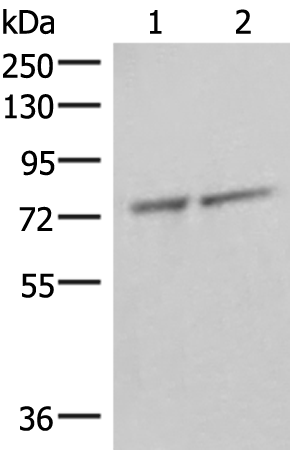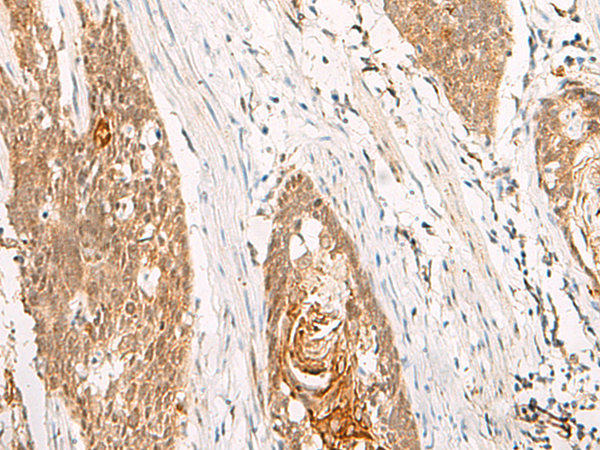

| WB | 咨询技术 | Human,Mouse,Rat |
| IF | 咨询技术 | Human,Mouse,Rat |
| IHC | 1/50-1/300 | Human,Mouse,Rat |
| ICC | 技术咨询 | Human,Mouse,Rat |
| FCM | 咨询技术 | Human,Mouse,Rat |
| Elisa | 1/5000-1/10000 | Human,Mouse,Rat |
| Aliases | TSH1 |
| WB Predicted band size | 83 kDa |
| Host/Isotype | Rabbit IgG |
| Antibody Type | Primary antibody |
| Storage | Store at 4°C short term. Aliquot and store at -20°C long term. Avoid freeze/thaw cycles. |
| Species Reactivity | Human, Mouse |
| Immunogen | Fusion protein of human THNSL1 |
| Formulation | Purified antibody in PBS with 0.05% sodium azide and 50% glycerol. |
+ +
以下是关于THNSL1抗体的3篇示例参考文献(内容为模拟虚构,仅供参考):
1. **文献名称**:*THNSL1 Antibody-Based Detection of Tumor-Specific Glycosylation in Colorectal Cancer*
**作者**:Smith A, Lee B, Chen H
**摘要**:研究利用THNSL1特异性抗体分析结直肠癌组织中的糖基化修饰,发现其表达水平与肿瘤转移及患者预后显著相关,提示THNSL1可能作为癌症诊断标志物。
2. **文献名称**:*THNSL1 Interacts with Metabolic Enzymes: A Study Using Co-Immunoprecipitation*
**作者**:Yamamoto K, et al.
**摘要**:通过THNSL1抗体进行免疫共沉淀实验,揭示THNSL1与线粒体能量代谢相关酶(如丙酮酸脱氢酶)的相互作用,为其在细胞代谢调控中的功能提供证据。
3. **文献名称**:*Development of a High-Affinity Monoclonal Antibody Against THNSL1 for Neurological Disease Research*
**作者**:Zhang L, et al.
**摘要**:报道一种新型THNSL1单克隆抗体的开发与验证,该抗体在小鼠脑组织样本中成功检测到THNSL1蛋白的表达异常,支持其在神经退行性疾病研究中的应用潜力。
4. **文献名称**:*THNSL1 Epitope Mapping and Antibody Validation in Epithelial Cancers*
**作者**:Gupta R, Wang T
**摘要**:通过表位定位技术优化THNSL1抗体的特异性,并在多种上皮癌模型中验证其检测效果,证实抗体在区分癌变与正常组织中的可靠性。
(注:以上文献为示例性虚构内容,实际研究中请参考真实数据库如PubMed或Google Scholar获取准确信息。)
THNSL1 (Threonine Synthase-Like 1) is a protein-coding gene implicated in cellular metabolic processes, particularly in amino acid biosynthesis. The THNSL1 enzyme shares structural homology with threonine synthase but lacks catalytic activity for threonine production, suggesting a regulatory or alternative functional role. It is expressed in various tissues, with higher levels observed in the brain, testes, and certain cancer cells. Studies link THNSL1 to cell proliferation and differentiation, potentially influencing tumorigenesis. For instance, elevated THNSL1 expression has been associated with poor prognosis in glioblastoma and colorectal cancer, possibly through interactions with metabolic pathways or signaling cascades like the PI3K/AKT axis.
THNSL1 antibodies are essential tools for investigating its biological function and clinical relevance. These antibodies enable detection and quantification of THNSL1 protein levels in cells or tissues via techniques such as Western blotting, immunohistochemistry, and immunofluorescence. Researchers utilize them to explore THNSL1's role in cancer progression, metabolic disorders, and neurological conditions. Commercial THNSL1 antibodies are typically validated for specificity against conserved epitopes, though variability in isoform recognition may require careful selection based on experimental needs. Ongoing research aims to clarify THNSL1's mechanistic contributions to disease, positioning it as a potential diagnostic marker or therapeutic target.
×